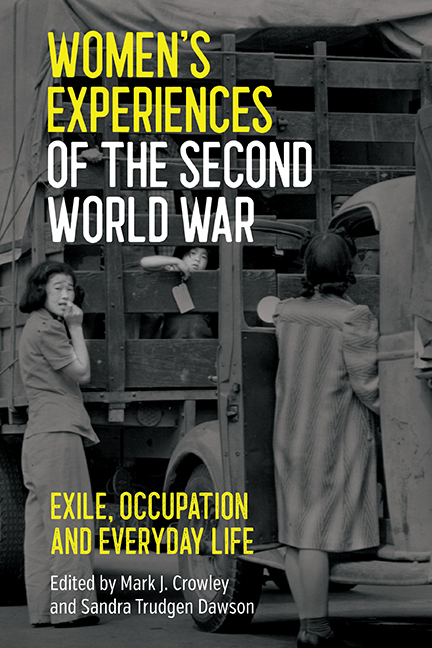Book contents
- Frontmatter
- Dedication
- Contents
- List of Illustrations
- List of Contributors
- Acknowledgements
- List of Abbreviations
- Introduction: Women’s Experiences of the Second World War: Exile, Occupation and Everyday Life
- Part One Living in Exile and under Wartime Occupation
- Part Two Living with Wartime Occupiers
- Part Three Everyday Life at Home and on the Battle Front
- Index
3 - Entertaining Exile: Norah O’Hagan and the Flying Herzogs at War, 1939–1945
Published online by Cambridge University Press: 03 June 2021
- Frontmatter
- Dedication
- Contents
- List of Illustrations
- List of Contributors
- Acknowledgements
- List of Abbreviations
- Introduction: Women’s Experiences of the Second World War: Exile, Occupation and Everyday Life
- Part One Living in Exile and under Wartime Occupation
- Part Two Living with Wartime Occupiers
- Part Three Everyday Life at Home and on the Battle Front
- Index
Summary
In 1926, Norah O’Hagan left home to join the circus. She was just eleven years old. Born in Newcastle, England, in 1915, Norah came from a mining family. Her father, William, worked in the pits of County Durham. Newcastle was a premier coal-mining region in England and the coal industry was the largest employer in the county. In the 1920s, County Durham was also one of the poorest areas in Britain. As a miner, William O’Hagan suffered significant losses of work and wages because of lockouts by owners and strikes by the miners attempting to improve working conditions and increase pay. One of the worst, the General Strike of May 1926, ended in defeat when miners were forced back to work for lower wages, exacerbating the poverty in the area and destabilizing families and family life.
The O’Hagan family was no exception. Child mortality was common. They lost their eldest child in 1916 when Norah was just a year old, leaving Norah as the oldest of the remaining three children. Indeed, England had one of the highest rates of infant and child mortality in Europe. Disaster struck the O’Hagan family again in 1922, when Norah's mother died of cancer. Norah was just seven years old. Faced with the loss of a caretaker for his children, William O’Hagan was forced to do what many poor, single parents did before the establishment of the welfare state – he placed Norah, aged seven, Bernard, aged five, and Peggy, aged two years old, in an orphanage. This experience of family disruption and dislocation shaped Norah's life. As a result of the loss and sense of exile from family life, she developed a sense of independence, and an ability to adapt to circumstances. This served Norah well when she left home and joined the circus.
This chapter examines the life of Norah O’Hagan as she navigated the extraordinary poverty of 1920s Newcastle, and forged a new identity as an entertainer in Nazi Germany and then in self-imposed exile in North America during the war years. Using oral interviews, press clippings, photographs and circus ephemera, this chapter explores the life of a remarkable young woman from an impoverished background who experienced loss and familial disruptions. She created a family and reinvented herself as a successful entertainer in the 1930s and 1940s.
- Type
- Chapter
- Information
- Women's Experiences of the Second World WarExile, Occupation and Everyday Life, pp. 43 - 62Publisher: Boydell & BrewerPrint publication year: 2021

